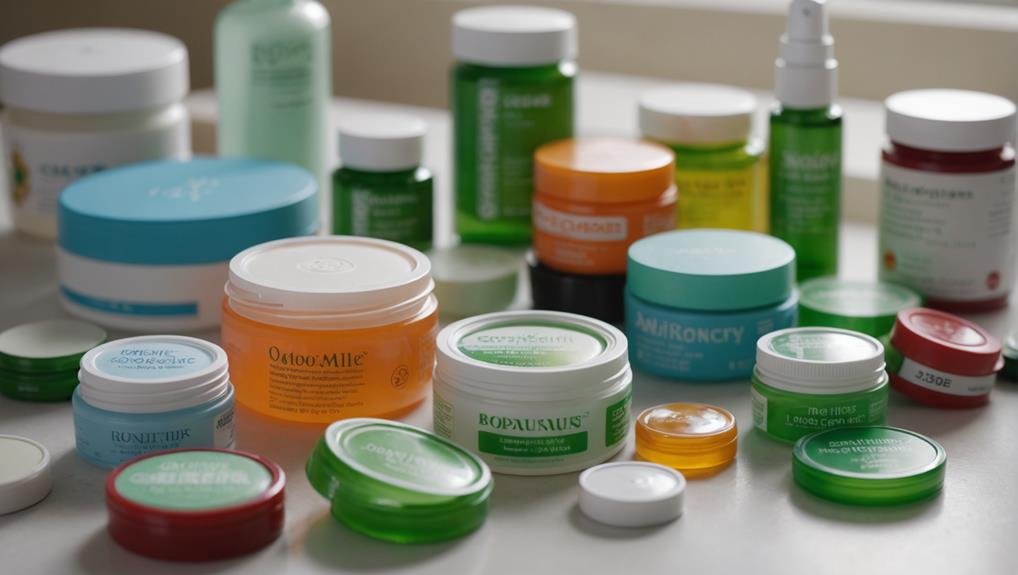How to Identify and Treat Skin Allergies#COMMA
When it comes to managing skin allergies, the difference between relief and discomfort lies in recognizing the telltale signs early on. Understanding the triggers and symptoms is just the first step in taking control of your skin health. By exploring various testing methods and treatment options, you can navigate the complexities of skin allergies with confidence and find a solution that works best for you.
Key Takeaways
- Recognize symptoms like redness, itching, swelling.
- Consult a healthcare provider for proper diagnosis.
- Avoid triggers like pollen, pet dander, certain foods.
- Treat with OTC options or prescription medications.
Common Skin Allergy Symptoms

If you're experiencing redness, itching, or swelling on your skin, these could be common symptoms of a skin allergy. Skin allergies can be caused by a variety of factors such as certain foods, medications, insect bites, or contact with irritants like soaps or cosmetics.
Prevention is key when it comes to managing skin allergies. Avoiding known triggers, using hypoallergenic products, and maintaining good skincare practices can help reduce the risk of allergic reactions.
In addition to redness, itching, and swelling, skin allergies may also present with other symptoms such as dryness, rash, or hives. Finding relief from these symptoms is essential for comfort and overall well-being. Over-the-counter antihistamines can help alleviate itching and redness, while topical corticosteroids can reduce inflammation and discomfort.
Keeping the affected area clean and moisturized can also aid in soothing skin allergy symptoms.
Being mindful of potential triggers, practicing good skincare habits, and seeking appropriate treatment can significantly improve your experience with skin allergies. Remember, it's essential to consult a healthcare professional for proper diagnosis and personalized treatment options.
Allergy Testing Methods
To determine the specific triggers causing your skin allergies, various allergy testing methods can be employed. Two common methods are patch testing and blood testing. Patch testing involves applying small amounts of potential allergens to your skin and observing for reactions. This method helps identify contact dermatitis triggers.
Blood testing, on the other hand, detects antibodies produced by your immune system in response to allergens.
Skin prick testing is another effective way to pinpoint allergens. During this test, a tiny amount of suspected allergens is pricked into your skin to observe for a reaction. It can identify allergens like pollen, pet dander, and foods.
Additionally, considering an elimination diet can be insightful. By removing potential trigger foods from your diet and then reintroducing them systematically, you can track how your body reacts, helping identify food allergies.
These testing methods play a crucial role in uncovering the culprits behind your skin allergies, guiding you towards effective treatment and management strategies.
Triggers to Watch For

Regularly monitoring common triggers like pollen, pet dander, certain foods, and skincare products is essential in identifying potential causes of skin allergies. Allergy triggers can vary from person to person, making it crucial to pay attention to how your skin reacts to different environmental factors and products.
Pollen, a common outdoor allergen, can lead to skin reactions such as itching, redness, or hives upon contact. Pet dander, another prevalent trigger, may cause similar symptoms if you have a sensitivity to it.
Certain foods like nuts, dairy, or shellfish can also act as allergy triggers, manifesting in skin reactions like eczema or swelling. Moreover, some skincare products containing fragrances, preservatives, or certain chemicals can trigger allergic reactions on the skin, resulting in irritation or a rash.
Contact Dermatitis Explained
Monitoring common triggers like pollen, pet dander, certain foods, and skincare products can help in identifying potential causes of skin allergies, leading to a better understanding of conditions such as contact dermatitis.
Contact dermatitis is a type of skin reaction that occurs when your skin comes into direct contact with an irritant or allergen, triggering redness, itching, and sometimes even blisters. To prevent contact dermatitis, it's crucial to identify and avoid the substances that cause the reaction.
This can include switching to hypoallergenic skincare products, wearing protective gloves when handling chemicals, and being mindful of potential allergens in your environment.
In terms of treatment options, mild cases of contact dermatitis can often be managed with over-the-counter topical creams to soothe the skin. If the reaction is more severe, your healthcare provider may prescribe corticosteroids or oral antihistamines to reduce inflammation and itching.
Additionally, making lifestyle changes such as incorporating a gentle skincare routine and avoiding known triggers can help prevent future flare-ups of contact dermatitis.
Food Allergies and Skin Reactions

Identifying food allergies that may be causing skin reactions is essential for effectively managing and treating these allergic responses. Skin rashes are a common symptom of food allergies, indicating an adverse immune reaction to specific foods.
When you experience a skin rash after consuming certain foods, it could be a sign of food intolerance, which differs from a food allergy. Food intolerance involves difficulty digesting certain foods, leading to various symptoms, including skin reactions like rashes, hives, or eczema.
To determine if a food allergy is causing your skin rash, keeping a detailed food diary can be beneficial. Note down the foods you eat and any corresponding skin reactions to identify potential triggers.
Consulting with a healthcare provider or allergist is crucial for accurate diagnosis and personalized treatment plans. They may recommend allergy testing or an elimination diet to pinpoint the specific food causing your skin reactions.
Understanding the link between food allergies and skin reactions empowers you to make informed choices to manage your symptoms effectively.
Seasonal Allergies Impact
Understanding how seasonal allergies impact your skin can help you effectively manage and alleviate related symptoms. When seasonal allergens like pollen or mold come into contact with your skin, they can trigger allergic reactions, leading to symptoms such as a skin rash. These rashes may appear as red, inflamed patches that are itchy and uncomfortable.
In addition to skin rashes, seasonal allergies can also affect the sensitive skin around your eyes, causing them to become itchy and watery. This can be particularly bothersome for individuals wearing contact lenses or makeup.
To manage these skin reactions caused by seasonal allergies, it's essential to identify and avoid triggers whenever possible. Using fragrance-free skincare products, taking cool showers, and applying soothing moisturizers can help alleviate skin irritation. Over-the-counter antihistamines may also provide relief for symptoms like itchy eyes.
If symptoms persist or worsen, consulting a dermatologist or allergist for further evaluation and treatment options is recommended. By understanding how seasonal allergies impact your skin and taking proactive steps to manage them, you can minimize discomfort and enjoy clearer, healthier skin during allergy season.
Managing Chronic Skin Allergies

To effectively manage chronic skin allergies, implementing a consistent skincare routine tailored to your specific sensitivities is crucial. This routine should include gentle cleansers, hypoallergenic moisturizers, and fragrance-free products to minimize irritation. Additionally, making lifestyle changes such as wearing loose-fitting clothing, avoiding known allergens, and using sunscreen can help prevent flare-ups. Stress management is also vital as high-stress levels can exacerbate skin allergies. Finding relaxation techniques that work for you, such as yoga, meditation, or deep breathing exercises, can significantly reduce skin reactions.
| Skincare Routine | Lifestyle Changes | Stress Management |
|---|---|---|
| Use gentle cleansers | Wear loose-fitting clothing | Practice relaxation techniques |
| Opt for hypoallergenic moisturizers | Avoid known allergens | Engage in yoga or meditation |
| Choose fragrance-free products | Use sunscreen | Practice deep breathing exercises |
| Moisturize regularly | ||
| Avoid harsh exfoliants |
Natural Remedies to Consider
Consider incorporating natural remedies into your skincare routine to help alleviate symptoms of skin allergies. Herbal remedies such as chamomile, calendula, and aloe vera have anti-inflammatory properties that can soothe irritated skin. These natural ingredients can be found in various forms, including creams, ointments, or essential oils, making them easy to integrate into your daily regimen.
DIY treatments like oatmeal baths or apple cider vinegar compresses can also provide relief from itching and redness associated with skin allergies.
Holistic approaches offer alternative therapies that focus on treating the whole person, not just the symptoms. Techniques like acupuncture, aromatherapy, or traditional Chinese medicine may help address underlying imbalances in the body that contribute to allergic reactions.
Over-the-Counter Treatments

Explore a range of over-the-counter treatments available for managing skin allergies, offering quick relief from symptoms such as itching and redness. When dealing with skin allergies, over-the-counter treatments can be a convenient option to alleviate discomfort. Below is a table showcasing some common over-the-counter treatments, including herbal and home remedies:
| Category | Treatment |
|---|---|
| Herbal Remedies | Aloe Vera Gel |
| Calendula Cream | |
| Chamomile Lotion | |
| Tea Tree Oil | |
| Home Remedies | Oatmeal Bath |
| Baking Soda Paste | |
| Apple Cider Vinegar | |
| Coconut Oil | |
| Witch Hazel Compress |
Herbal remedies such as Aloe Vera Gel and Tea Tree Oil possess anti-inflammatory properties, aiding in soothing irritated skin. Home remedies like an Oatmeal Bath or a Baking Soda Paste can help relieve itching and redness effectively. Remember to test a small patch of skin before widespread use to ensure no adverse reactions occur. These over-the-counter options can be a beneficial addition to your skincare routine for managing skin allergies.
Prescription Medications Overview
When seeking more potent treatments for managing skin allergies, prescription medications offer targeted relief from persistent symptoms. These medications are often prescribed by a healthcare provider after over-the-counter options have proven ineffective. It's important to note that prescription medications can vary widely in their mechanisms of action and potential side effects.
In some cases, prescription antihistamines like cetirizine or loratadine may be recommended to help control itching and hives. For more severe allergic reactions, corticosteroids such as prednisone may be prescribed to reduce inflammation and alleviate symptoms quickly. Additionally, immunomodulators like tacrolimus or pimecrolimus may be used for chronic conditions like eczema.
While prescription medications can be highly effective in managing skin allergies, it's crucial to be aware of potential side effects. These may include drowsiness, weight gain, increased risk of infections, or skin thinning. Always follow your healthcare provider's instructions carefully and communicate any concerns about medication side effects promptly. Remember, alternative therapies and lifestyle changes can also complement prescription medications in managing skin allergies effectively.
Allergy-Proofing Your Home

To create a more allergy-friendly environment at home and minimize potential triggers for skin allergies, implementing certain measures can help significantly. Here are some tips to allergy-proof your home:
- Wash Bedding Frequently: Use hot water to wash sheets, pillowcases, and blankets regularly to prevent the accumulation of dust mites.
- Invest in Allergen-Proof Covers: Cover mattresses, pillows, and box springs with allergen-proof covers to create a barrier against dust mites.
- Vacuum Regularly: Use a vacuum cleaner with a HEPA filter to efficiently remove dust mites and pet dander from carpets, rugs, and upholstery.
- Keep Humidity Levels Low: Dust mites thrive in humid environments, so use a dehumidifier to maintain humidity levels below 50%.
When to Seek Medical Help
If you notice persistent or severe skin allergy symptoms that don't improve with over-the-counter treatments, consulting a healthcare provider is recommended. Skin allergies can manifest in various ways, such as a skin rash or itchy skin. When these symptoms become bothersome and affect your daily life, seeking medical help is crucial.
A healthcare provider can conduct tests to identify the specific allergen triggering your skin reactions. They may recommend prescription-strength medications to alleviate the symptoms effectively.
Additionally, if your skin rash is spreading rapidly, becoming increasingly painful, or showing signs of infection like warmth, redness, or pus, don't hesitate to seek immediate medical attention. These could be indications of a more serious condition requiring prompt intervention.
Remember that your health and well-being are paramount, and seeking medical help for persistent or severe skin allergy symptoms is a proactive step towards managing and treating your condition effectively. Trust your instincts and prioritize your skin health by consulting a healthcare provider when needed.
Frequently Asked Questions
Can Stress Trigger Skin Allergies?
When stress triggers skin allergies, your body reacts with symptoms like rashes and itching. To manage this, focus on stress relief techniques like deep breathing and meditation. Incorporating a skincare routine can also help alleviate allergy symptoms.
How Can I Prevent Skin Allergies at Work?
To prevent skin allergies at work, take precautions like wearing protective gear and avoiding triggers. Did you know 80% of workplace allergies are caused by direct contact? Stay safe by being proactive.
Are There Specific Skin Allergies Related to Pets?
When it comes to pet-related skin allergies, it's crucial to be aware of potential triggers like pet dander allergies and animal fur sensitivities. These can cause skin reactions, so take precautions if you suspect sensitivity.
Can Skin Allergies Develop Suddenly?
Sometimes skin allergies can sneak up on you like a mischievous cat. Triggers vary, but sudden onset is possible. Look for redness, itching, or hives. Treatments include creams, antihistamines, and avoidance. Prevention means understanding your body's signals.
Are Skin Allergies Hereditary?
Yes, skin allergies can be hereditary. Genetic predisposition plays a role, but environmental factors also contribute. Allergy testing can help identify triggers, and treatments like topical creams, antihistamines, and lifestyle changes can manage symptoms effectively.
Conclusion
Now that you've learned how to identify and treat skin allergies, remember that knowledge is power when it comes to managing your skin health.
Just like a detective solving a mystery, use the clues of common symptoms, testing methods, and triggers to uncover the root cause of your skin reactions.
With the right tools and resources, you can take charge of your skin allergies and find relief from the itchiness and discomfort.





